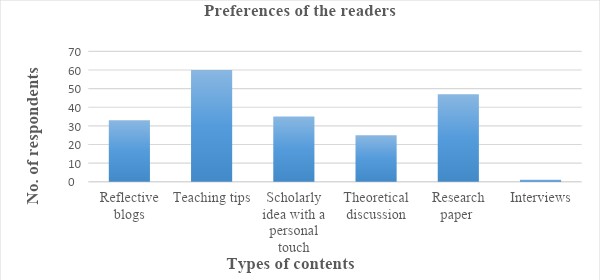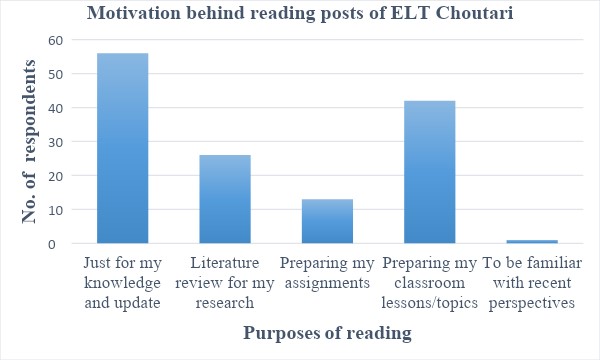
Introduction
ELT Choutari, initiated in January 2009, is Nepal’s first collaborative and most-read digital ELT magazine which contributes to the ELT discourse in particular and education in general. Initiated by ELT pioneers and enthusiasts, it has been serving as a virtual forum to connect ELT professionals and engage them in critical discussion on the diversified issues of ELT. Most importantly, it has been a great platform for the young, emerging and passionate scholars to share their voices, stories, and native perspectives. In addition, it has also generated theoretical discussions, multiple perspectives on different ELT issues, and scholarly debates from the established experts from home and abroad. Likewise, it brings academics, policy-makers, teachers, and students together to supplement scholarly discourse on ELT and more. This forum has also been a huge resource bank for researchers and ELT practitioners for the last 12 years.
In this context, with the purpose of understanding the views, preferences, and expectations of our readers, authors, and well-wishers, we conducted a digital survey. For this, a google form was used with both close-ended and open-ended questions, and data were elicited through it. 79 responses were obtained altogether. The options given for close-ended questions were mutually inclusive where a participant could choose more than one option. Among the respondents, 77.2% were teachers, 25.3% were trainers, 24.1% were research students, 21.5% were researchers and 15.2 % were graduate students.
Analysis and discussion
In this section, the elicited data are presented and discussed under four subsequent themes: preferred contents of the respondents, the motivation behind reading our contents, expectations of our readers, and feedback and suggestions.
Preferred contents of the respondents
In order to explore the preferences of our readers, we asked them to choose the types of articles they prefer reading on ELT Choutari. Here, they could choose more than one option. The following pictorial representation illustrates the data in an explicit way.

Through the responses, it was revealed that three-fourth of our readers (i.e. 75.9%) preferred reading articles related to teaching tips. Since the majority of the navigators (i.e. 77.2%) were teachers, it was obvious that teaching tips are mostly sought for. Following this were the readers who liked reading research papers i.e. 59.5%. The third preference was given to scholarly ideas with a personal touch i.e. 44.3%. Similarly, 41.8% readers read ELT Choutari for reflective blogs, 31.6% read for theoretical discussion. And finally, 1.3% of the readers read interviews. So, it shows that ELT Choutari should offer articles and blogs related to teaching tips, research papers, and scholarly writing with a personal touch and reflective narrative. Moreover, interviews were also preferred by a few respondents, which was chosen under the ‘others’ options. Had there been a separate option for ‘interview’, it would have been the preference of more.
Motivation behind reading our contents
Our second intention was to explore the motivation of the readers behind reading our contents. Thus, we inquired the respondents about the reasons for reading the articles and resources on ELT Choutari. The following diagram represents the data elicited under this heading.
 The given figure reveals that most of the readers (i.e. 70.9%) have a general purpose of enriching their knowledge and updating themselves. The second reason for reading the resources on ELT Choutari is for preparing classroom lessons/topics and 53. 2% of our readers are guided by this motivation. Similarly, 32.9% of our readers are the researchers who navigate our resources for reviewing the related literature for their research. Following them are the students comprising 16.5% of the respondents who take support from this forum while preparing their assignment. Additionally, a few readers (i.e. 1.3%) read our articles to be familiar with recent perspectives.
The given figure reveals that most of the readers (i.e. 70.9%) have a general purpose of enriching their knowledge and updating themselves. The second reason for reading the resources on ELT Choutari is for preparing classroom lessons/topics and 53. 2% of our readers are guided by this motivation. Similarly, 32.9% of our readers are the researchers who navigate our resources for reviewing the related literature for their research. Following them are the students comprising 16.5% of the respondents who take support from this forum while preparing their assignment. Additionally, a few readers (i.e. 1.3%) read our articles to be familiar with recent perspectives.
The expectation of our readers
To explore the expectations of our readers regarding the types of content they would like to read in the future, an open-ended question was asked. In this line, it was found that the expectations of the majority of readers range from theoretical discussion to practical tips, for instance, classroom management, classroom interaction, teaching literature, reflections on classroom practices, and ELT tips. This indicates that the articles on ELT Choutari have been meeting the expectations of the majority of the readers. Besides this, there are some expectations regarding the innovative topics in the field of teaching-learning such as critical pedagogy, teaching English in a multilingual society, post-method pedagogy, eco-pedagogy, ICT in education, etc. The respondents further expected the articles to cover more research-based contents which would supplement them with the proven facts and generalizable ideas. Moreover, personal anecdotes and reflections should also be given due emphasis.
Feedback and suggestions
For obtaining feedback and suggestions for improvement, an open-ended question was asked with our readers. After analyzing their suggestions it was revealed that most of the respondents were satisfied with the contents of our magazine since they have suggested the continuation of the same. However, some of them wished for more updated content capturing the latest trends in the field and more articles based on the research. Similarly, some of the readers have suggested widening the readership so that more people would be benefitted. There are some respondents who have also suggested us to follow the standard procedures of review so as to maintain the standard of peer-reviewed journals.
Conclusion
Although the readers seem to be satisfied with the contents on ELT Choutari, there is a need to accommodate itself with the flow of the time. Valuing the suggestions from the readers, attention should be given to readers’ expectations for research-based articles, practical teaching tips, and more scholarly discussion and discourse on critical issues like multilingualism, critical pedagogy, justice in ELT, authenticity, and creativity in ELT. Similarly, it is recommended to train and orient young and emerging authors time-to-time to develop original and relevant content with excellent presentation. Moreover, it is often criticized ELT Choutari for enjoying only a limited readership despite having excellent contents and resources. Therefore, effort and attention should be oriented towards maximising our readership and impact. Finally, to generate more generalizable ideas, it is recommended to launch more surveys in the future to reach more readers.
The author: Karuna Nepal is an English faculty at Innovative Sunshine College. She also teaches at Shree Krishna Secondary School. She has completed her M.Phil. in English from Pokhara University. Her areas of interest include translation, philosophy, and literature.
[Note: since you have come up to here reading the whole piece, please share your feeling, feedback or any question related to this post in the comment box below, which will encourage the author. Thank you!]
Can be cited as:
Nepal, K. (2021, January). Exploring the readers’ response and reflections [Blog article]. ELT CHOUTARI. Available at: https://eltchoutari.com/2021/01/exploring-the-readers-response-and-reflections/